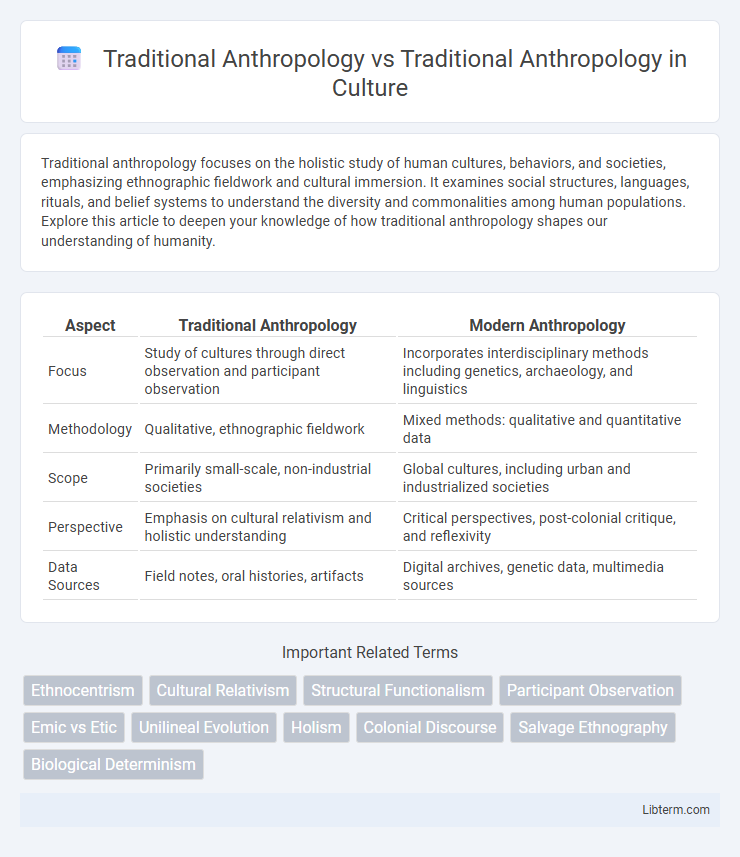Traditional anthropology focuses on the holistic study of human cultures, behaviors, and societies, emphasizing ethnographic fieldwork and cultural immersion. It examines social structures, languages, rituals, and belief systems to understand the diversity and commonalities among human populations. Explore this article to deepen your knowledge of how traditional anthropology shapes our understanding of humanity.
Table of Comparison
| Aspect | Traditional Anthropology | Modern Anthropology |
|---|---|---|
| Focus | Study of cultures through direct observation and participant observation | Incorporates interdisciplinary methods including genetics, archaeology, and linguistics |
| Methodology | Qualitative, ethnographic fieldwork | Mixed methods: qualitative and quantitative data |
| Scope | Primarily small-scale, non-industrial societies | Global cultures, including urban and industrialized societies |
| Perspective | Emphasis on cultural relativism and holistic understanding | Critical perspectives, post-colonial critique, and reflexivity |
| Data Sources | Field notes, oral histories, artifacts | Digital archives, genetic data, multimedia sources |
Introduction to Traditional Anthropology
Traditional Anthropology primarily examines human cultures, societies, and biological aspects through ethnographic fieldwork, participant observation, and comparative analysis. Its methodology emphasizes understanding cultural norms, social structures, and human evolution by immersive, long-term study of communities. This foundational approach contrasts with emerging forms of anthropology that integrate technological tools and interdisciplinary perspectives for broader analyses.
Core Principles of Traditional Anthropology
Traditional Anthropology emphasizes holistic study, examining human cultures, societies, and biological aspects through participant observation and ethnographic methods. Its core principles include cultural relativism, valuing diverse cultural expressions without ethnocentric bias, and the integration of biological, archaeological, linguistic, and sociocultural data to understand human behavior comprehensively. Fieldwork serves as a foundational approach, enabling anthropologists to gather qualitative data that reflect lived experiences and societal norms.
Key Figures in Traditional Anthropology
Key figures in Traditional Anthropology include Franz Boas, who is often regarded as the father of American anthropology and emphasized cultural relativism and fieldwork. Bronislaw Malinowski pioneered participant observation, fundamentally shaping ethnographic methods. Edward B. Tylor introduced cultural evolutionism, laying groundwork for understanding human societies through comparative studies of mythology and customs.
Evolution of Anthropological Thought
Traditional anthropology initially emphasized cultural relativism and ethnographic fieldwork as core methods for understanding diverse human societies. Over time, the evolution of anthropological thought incorporated interdisciplinary approaches, integrating biological, linguistic, and archaeological insights to create a holistic view of human development. Contemporary perspectives challenge earlier static frameworks by emphasizing dynamic social processes, power relations, and globalization's impact on cultural identities.
Methodologies Used in Traditional Anthropology
Traditional Anthropology employs qualitative methodologies such as participant observation, ethnographic fieldwork, and in-depth interviews to gather rich cultural data directly from communities. These methods emphasize immersive experiences and longitudinal studies to understand social structures, rituals, and daily practices. The use of qualitative analysis allows anthropologists to interpret cultural meanings and human behaviors within specific contexts accurately.
Comparative Overview: Traditional Approaches
Traditional anthropology primarily emphasizes ethnographic fieldwork and participant observation to understand human cultures deeply, while traditional archaeology relies on excavation and material analysis to reconstruct past societies. The comparative overview reveals that anthropology prioritizes living cultural practices and social behaviors, whereas archaeology focuses on tangible artifacts and environmental contexts. Both approaches share a commitment to systematic data collection but differ in their theoretical frameworks and sources of evidence.
Critiques of Traditional Anthropology
Critiques of Traditional Anthropology focus on its ethnocentric biases and colonialist perspectives that often marginalized Indigenous voices and reinforced stereotypes. Scholars highlight the lack of reflexivity and the tendency to impose Western categories on diverse cultures, leading to inaccurate representations. The critique urges a shift toward more inclusive, collaborative, and decolonized approaches that respect cultural autonomy and local knowledge systems.
Contributions of Traditional Anthropology to Modern Studies
Traditional Anthropology has significantly contributed to modern studies by providing foundational ethnographic methods and cross-cultural analyses that deepen understanding of human societies. Its emphasis on participant observation and holistic approaches laid the groundwork for interdisciplinary research in sociology, psychology, and cultural studies. These contributions continue to influence contemporary methodologies and theoretical frameworks across social sciences.
Relevance of Traditional Anthropology Today
Traditional anthropology remains essential for understanding cultural diversity, social structures, and human evolution, offering foundational insights into indigenous practices and historical contexts. Its methodologies and ethnographic studies provide valuable data for contemporary fields such as sociology, archaeology, and human geography. Despite modern technological advances, traditional anthropology's focus on immersive participant observation continues to yield nuanced, qualitative perspectives critical for addressing cultural preservation and social justice issues today.
Future Perspectives on Traditional Anthropology
Future perspectives on Traditional Anthropology emphasize integrating digital technologies and interdisciplinary methods to enhance cultural analysis and ethnographic research. Advances in artificial intelligence and big data facilitate more nuanced understanding of human societies, enabling anthropologists to predict social trends and cultural shifts accurately. Embracing these innovations ensures the discipline remains relevant by addressing contemporary global challenges through a traditional anthropological lens.
Traditional Anthropology Infographic

 libterm.com
libterm.com